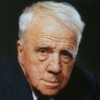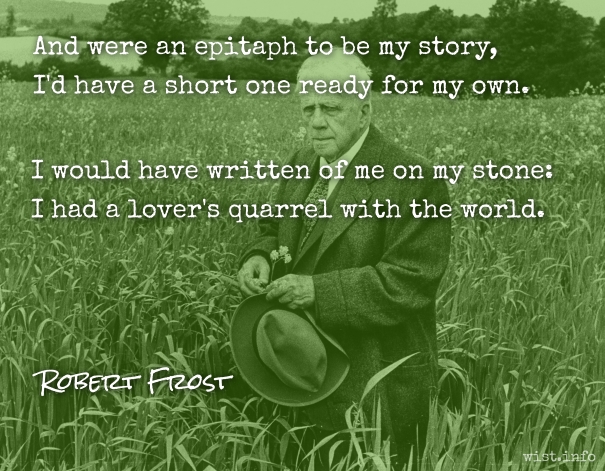Quotations by:
Frost, Robert
The best way out is always through.
Some say the world will end in fire,
Some say in ice.
From what I’ve tasted of desire
I hold with those who favor fire.
But if it had to perish twice,
I think I know enough of hate
To say that for destruction ice
Is also great
And would suffice.
The nearest friends can go
With anyone to death, comes so far short
They might as well not try to go at all.
No, from the time when one is sick to death,
One is alone, and he dies more alone.
Friends make pretence of following to the grave,
But before one is in it, their minds are turned
And making the best of their way back to life
And living people, and things they understand.
We love the things we love for what they are.
Good fences make good neighbors.
Robert Frost (1874-1963) American poet
“Mending Wall” (1914)
(Source)
The narrator's neighbor speaking. The phrase predates Frost (and has analogs in many languages and cultures), but achieved additional currency by his use.
The woods are lovely, dark and deep,
But I have promises to keep,
And miles to go before I sleep,
And miles to go before I sleep.Robert Frost (1874-1963) American poet
“Stopping by Woods on a Snowy Evening,” st. 4 (1923)
Full text.
You don’t have to deserve your mother’s love. You have to deserve your father’s. He’s more particular. One’s a Republican, one’s a Democrat. The father is always a Republican toward his son, and his mother’s always a Democrat.
Robert Frost (1874-1963) American poet
“The Art of Poetry No. 2,” interview by R.Poirier, Paris Review #24 (Summer-Fall 1960)
Full text.
Most of the change we think we see in life
Is due to truths being in and out of favor.
Home is the place where, when you have to go there,
They have to take you in.
And nothing to look backward to with pride,
And nothing to look forward to with hope.
No tears in the writer, no tears in the reader. No surprise for the writer, no surprise for the reader.
Robert Frost (1874-1963) American poet
“The Figure a Poem Makes,” Collected Poems, Preface, “The Figure a Poem Makes” (1939)
(Source)
And were an epitaph to be my story,
I’d have a short one ready for my own.
I would have written of me on my stone:
I had a lover’s quarrel with the world.
No speed of wind or water rushing by
But you have a speed far greater. You can climb
Back up a stream of radiance to the sky,
And back through history up the stream of time.
And you were given this swiftness, not for haste
Nor chiefly that you may go where you will.
But in the rush of everything to waste,
That you may have the power of standing still—
Off any still or moving thing you say.
Two such as you with a master speed
Cannot be parted nor be swept away
From one another once you are agreed
That life is only life forevermore
Together wing to wing and oar to oar.Robert Frost (1874-1963) American poet
“The Master Speed” (1934)
(Source)
Collected in A Further Range (1937). Frost wrote the poem for his daughter's wedding, and the final line is the epitaph on his wife's portion of their gravestone.
It is absurd to think that the only way to tell if a poem is lasting is to wait and see if it lasts. The right reader of a good poem can tell the moment it strikes him that he has taken an immortal wound — that he will never get over it.
I shall be telling this with a sigh
Somewhere ages and ages hence:
Two roads diverged in a wood, and I —
I took the one less traveled by,
And that has made all the difference.
The old dog barks backward without getting up;
I can remember when he was a pup.
The sun was warm but the wind was chill.
You know how it is with an April day
When the sun is out and the wind is still,
You´re one month on in the middle of May.
But if you so much as dare to speak,
A cloud comes over the sunlit arch,
A wind comes off a frozen peak,
And you´re two months back in the middle of March.
There are two types of realist. There is the one who offers a good deal of dirt with his potato to show that it is a real one, and the one who is satisfied with the potato brushed clean. I’m inclined to be the second kind. To me, the thing that art does for life is to clean it, to strip it to form.
You’ve been broadened and enlarged [by college] to where you can listen to almost anything without losing your temper or your self-confidence.
Robert Frost (1874-1963) American poet
Commencement Address, Dartmouth (Jun 1955)
Full text.Commonly quoted: "Education is the ability to listen to almost anything without losing your temper or your self-confidence."
We’re like a rich father who wishes he knew how to give his son the hardships that made the father such a man.
Robert Frost (1874-1963) American poet
Comment, “Meet the Press” (22 Mar 1959)
When asked by Ernest Lindley whether American civilization had improved or declined in his lifetime. Often misquoted as "Americans are like a rich father who wishes he knew how to give his son the hardships that made him rich."



